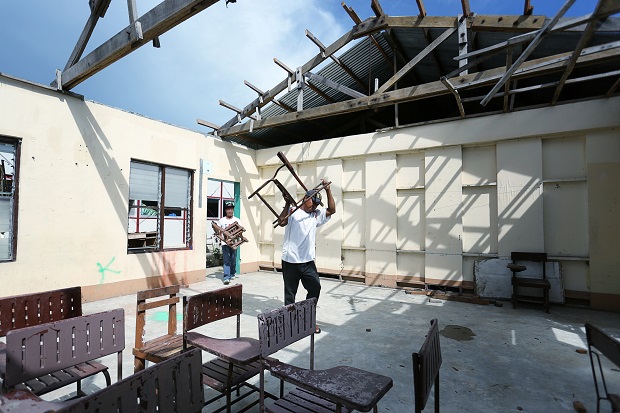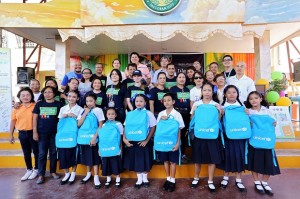Unicef, partners push for safe schools as children prepare for new school year

Community members participate in the Brigada Eskwela program by cleaning the surroundings of the Sto. Niño SPED Center school in Tacloban City. UNICEF is targeting 500,000 children to go back to school and continue learning in Typhoon Haiyan/Yolanda-affected regions.
MANILA, Philippines – Some 550,000 children, teachers and day-care workers are expected to return back to learning on June 2, nearly seven months after Typhoon “Yolanda (international name: Haiyan) devastated 3,200 schools and day-care centers. The back to learning in a new school year is a significant milestone.
As Unicef and education cluster partners are supporting the Department of Education (DepEd) in bringing children back to school in the typhoon-affected areas, the importance of safe schools is high on the agenda.

Pupils, DepED representatives, school staff, parents, UNICEF partner organisations and other community stakeholders pose for a group photo during the “Welcome Back to Learning in a Safe School” event held at Kapangian Central School in Tacloban City on 21 May 2014.
In the launch of Back to Learning in a Safe School campaign, Department of Education Undersecretary Mario Deriquito said that DepEd promoted schools as “safe havens” for children after the destruction caused by the super typhoon, highlighting the 2014 Brigada Eskwela theme of “Making our Schools Safer.”
Resuming education in a safe learning environment is a crucial element in helping children regain a sense of normalcy and stability after a major emergency such as Yolanda. Schools must continue to provide a framework for psychosocial support that children need to recover from, and ensure that all children affected by the typhoon return to school.
Unicef is targeting 500,000 children to go back to school and continue learning in the affected regions. The Education Cluster, led by DepEd, constitutes of organizations working in the education sector. The cluster mechanism seeks to make humanitarian assistance more effective through coordinating efforts, addressing and reducing gaps, maximizing resources, and by sharing strategic information and planning.
The Mayor of Tacloban Alfred Romualdez lauded the assistance of humanitarian partners in launching the Back to Learning in a Safe School. Aside from the campaign launch at the Kapangian Central School here, simultaneous activities are being conducted in schools across the affected regions.
“Education is not only a basic human right, but a tool for recovery. Unicef considers education an integral part of any humanitarian response to an emergency,” said Lotta Sylwander, Unicef Philippines Representative.
From the outset, Unicef supported continuing education in Yolanda-affected areas with repairs for damaged classrooms, provision of supplies, teacher training on Education in Emergencies, psychosocial support and child-centered learning practices. School-based disaster risk reduction is also promoted, involving activities by, for and with children, such as hazard and vulnerability mapping, school safety committees and school disaster planning linked to barangay (village) early warning systems.
To date, Unicef and partners have reached 470,000 pre-school and school-aged children with learning supplies and materials in the affected areas. Some 135,000 children benefited from 1,351 temporary learning spaces equipped with school-in-a-box kits, and recreational and early childhood and development materials.
About 837 education service providers were trained on emergency-related subjects including disaster risk reduction and continuing education during emergencies. Psychosocial support for both teachers and students is a key area of intervention for the campaign. Special attention focused on life-skills programmes, such as health promotion and sanitation and good hygiene practices.
RELATED STORIES